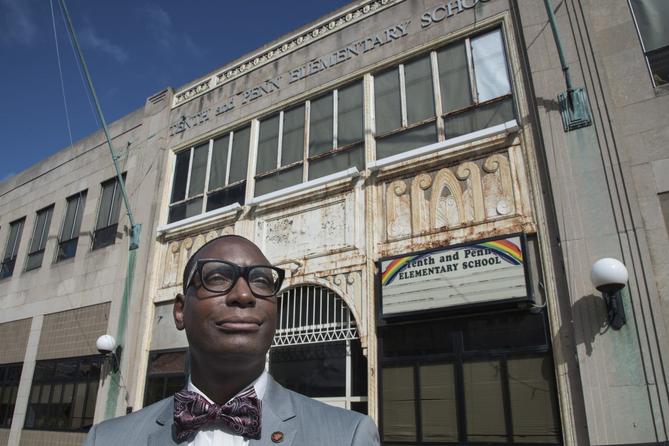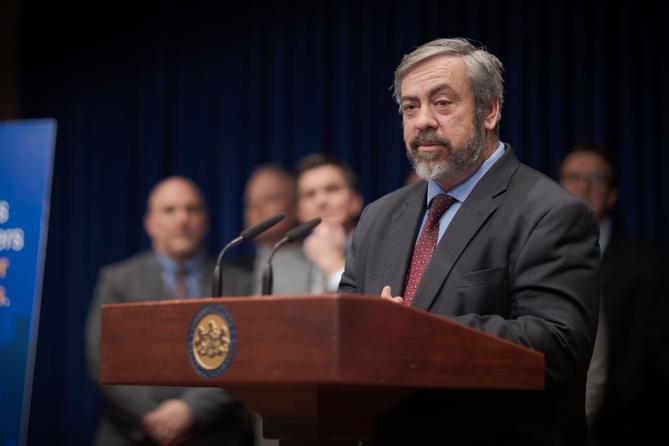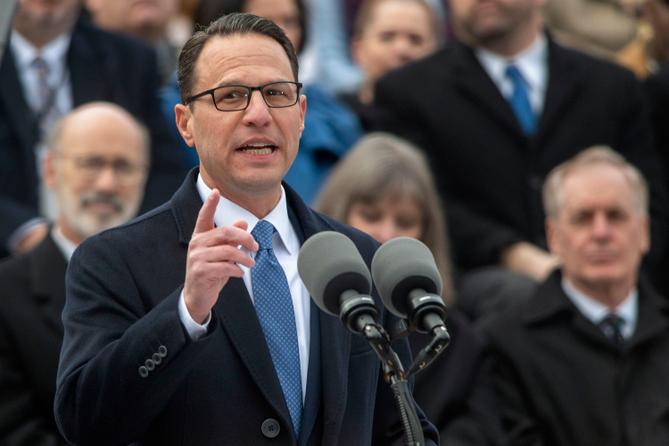Spotlight PA is an independent, nonpartisan newsroom powered by The Philadelphia Inquirer in partnership with PennLive/The Patriot-News, TribLIVE/Pittsburgh Tribune-Review, and WITF Public Media. Sign up for our free newsletters.
HARRISBURG — Gov. Josh Shapiro’s proposed cabinet would assemble people from across the ideological spectrum who already have experience at top levels of government and public service.
The Democrat’s department chairs will preside over the day-to-day operations of state programs that affect the lives of millions of Pennsylvanians — from the Department of Human Services, which administers food and medical care assistance programs, to the Department of State, which oversees the commonwealth’s highly scrutinized elections.
As in past administrations, many of the new appointees have long histories with Shapiro. And in line with the new governor’s reputation as a moderate and a pragmatist, his choices sometimes cross partisan lines, and skew toward people who already have held top state jobs or worked in public administration, rather than outside experts.
All cabinet appointees must be approved by the state Senate, which is controlled by Republicans.
- Aging: Jason Kavulich
- Agriculture: Russell Redding
- Banking and Securities: Sarah Hammer
- Community and Economic Development: Rick Siger
- Conservation and Natural Resources: Cindy Dunn
- Corrections: Laurel Harry
- Drug and Alcohol Programs: Latika Davis-Jones
- Education: Khalid Mumin
- Emergency Management: Randy Padfield
- Environmental Protection: Rich Negrin
- Fire: Thomas Cook
- General Services: Reggie McNeil
- Health: Debra Bogen
- Human Services: Val Arkoosh
- Insurance: Mike Humphreys
- Labor and Industry: Nancy Walker
- Military and Veterans Affairs: Mark Schindler
- Revenue: Pat Browne
- State: Al Schmidt
- State Police: Christopher Paris
- Transportation: Michael Carroll
Aging: Jason Kavulich
Kavulich is from Scranton and has spent most of his career in Lackawanna County — first working as a county caseworker, then rising to director of the Lackawanna County Area Agency on Aging.
In that role, he oversaw the administration of quality-of-life boosters like local meal delivery, coordination of caregivers, and programs like adult day care, as well as the investigation of abuse allegations and gave access to legal services.
He also worked closely with the state Department of Aging. In December, Kavulich and administrators in four other counties announced they would participate in the state’s fledgling Shared Housing and Resource Exchange Program, or SHARE. Kavulich said in a statement it would help deal with “unprecedented challenges in securing affordable housing and in-home assistance for older adults.”

Agriculture: Russell Redding
Shapiro nominated Redding, the current secretary of agriculture, to return to the position. Redding, who grew up and worked on a dairy farm, has nearly a decade of experience in the role — first for Democratic Gov. Ed Rendell in a two-year stint and then under Democratic Gov. Tom Wolf since 2015.
Redding backed the 2019 Pennsylvania Farm Bill, a $23 million package aimed at bolstering the agriculture industry by providing funding for agricultural disasters and food safety testing facilities. The bill has been renewed each subsequent year.
As secretary, Redding is also responsible for conservation and sustainability efforts in the agricultural industry.
Redding’s nomination has been lauded by conservation advocacy groups like PennFuture and the Chesapeake Bay Foundation.
Banking and Securities: Sarah Hammer
If confirmed, Hammer will join the Shapiro administration via the University of Pennsylvania’s Wharton School, where she works as managing director of the Stevens Center for Innovation in Finance.
Before that, she spent a year working in financial institution policy at the U.S. Treasury, according to her LinkedIn. She also served on the board of the nonprofit Securities Investor Protection Corporation, which helps protect investors from losing money to failed brokerage firms.
Hammer spent the earlier part of her career at large financial services companies, including Vanguard, PIMCO, and JP Morgan Chase.
As banking and securities secretary, Hammer would be tasked with overseeing the regulation of state-chartered banks, credit unions, and trust companies, of which there are more than 160.
She said in a statement that she will “work to strengthen and enhance our consumer protection efforts while ensuring the banking and securities industry operates fairly and efficiently.”
Community and Economic Development: Rick Siger
Siger is currently the chief of staff and senior advisor to the president of Carnegie Mellon University and has worked extensively in politics.
Siger served in the administration of former Democratic Virginia Gov. Tim Kaine, and he worked under former President Barack Obama as chief of staff at the Office of Science and Technology Policy and deputy chief of staff at the Department of Commerce. Siger was also a member of the”innovation policy committee” of President Joe Biden’s 2020 campaign and volunteered on his presidential transition.
At CMU, Siger advises the president on community engagement and economic development. He previously worked as the head of university engagement at Piazza Technologies, a social learning platform for students and faculty.
The Department of Community and Economic Development is charged with growing the business community in Pennsylvania, and has an annual budget of over $300 million. If confirmed, Siger will advise Shapiro on policy regarding job creation, economic development, and community engagement.
Conservation and Natural Resources: Cindy Dunn
Dunn already serves as secretary of the Department of Conservation and Natural Resources, and if confirmed, she will continue to be responsible for the maintenance and preservation of the state’s parks and forests.
She’s been doing that work in one way or another for the past three decades.
In 2013, she was CEO and president of PennFuture, an environmental organization, where she worked to conserve Pennsylvania’s natural resources and landscape and advocated against practices such as natural gas drilling.
Many of the environmental conservation organizations that Dunn worked with in the past now commend Shapiro for his appointment, including PennFuture and the Chesapeake Bay Foundation. David Callahan, president of the Marcellus Shale Coalition — an organization that supports natural gas production in Pennsylvania — has also supported Dunn’s reappointment.
Under the Wolf administration, Dunn added four new state parks and pledged to have the agency exclusively use renewable energy by 2030. In 2018, Dunn also developed the state’s first climate change mitigation plan.
Dunn also procured an additional $220 million investment toward the Clean Streams Fund, which protects the water quality of rivers and streams in Pennsylvania. Another $100 million from the American Rescue Plan Act went to state parks.
Corrections: Laurel Harry
Harry has worked for Pennsylvania’s Department of Corrections in various capacities for 24 years, first as a drug and alcohol treatment specialist at the Waynesburg prison. Along the way, she’s worked in six different prisons.
She’s spent the past decade as superintendent of SCI Camp Hill. Every man who enters the system first passes through that prison for screening before, in most cases, being moved to a different facility.
As secretary, Harry will oversee a system of 23 prisons (and a boot camp) that in recent years has been working to reduce its population.
Drug and Alcohol Programs: Latika Davis-Jones
Davis-Jones already has direct experience with drug and alcohol programs.
After working as a drug counselor in Pittsburgh and teaching at the University of Pittsburgh’s School of Social Work, Davis-Jones took over as administrator of Pittsburgh’s Bureau of Drug and Alcohol Services in 2011. There, she ran programs for people living with drug and alcohol addiction, brought early intervention programs to places like schools, and evangelized the use of naloxone to prevent fatal overdoses.
She appeared before a joint hearing of the state House and Senate policy committees in 2016 to share her experience with the opioid epidemic in Allegheny County. She urged lawmakers to think of addiction not as a problem that requires “episodic” care, but to commit to “a chronic care and disease-based approach.”
Davis-Jones spent more than nine years in Allegheny County government, then moved into the health care industry as senior director of behavioral health at Highmark Wholecare.

Education: Khalid Mumin
Since 2021, Mumin has been superintendent in Lower Merion, one of Pennsylvania’s wealthiest public districts, both in terms of household income and per-student spending. But before that, he helmed a very different school district, Reading City, which is one of the commonwealth’s poorest.
As Reading superintendent, Mumin spoke to The Inquirer about long-standing funding inequities at Pennsylvania schools, particularly urban ones. He said his goal was “to be sure we’re giving our kids the same opportunities the suburban kids have.”
Mumin also vocally supported putting money into PlanCon, a state program that reimburses districts for construction projects, telling local news station WFMZ it’s necessary “especially for school districts like Reading School District, with old infrastructure, beautiful buildings but need a lot of work.” It hasn’t been funded since a 2015 budget battle and is taking no new applicants.
Before his tenure at Reading, Mumin was superintendent in Caroline County, Maryland, and worked for schools in Bucks, Lancaster, and York Counties.
As education secretary, Mumin will be in charge of monitoring school operations and making recommendations — previous secretaries have, for instance, pushed for more charter school oversight. He also will determine state education standards and ensure schools meet them, as well as establish how to best evaluate teachers.
Emergency Management: Randy Padfield
Padfield has led the Pennsylvania Emergency Management Agency since 2019. He’s responsible for coordinating the commonwealth’s responses to disasters ranging from floods to fires to shootings.
He played a prominent role in the commonwealth’s response to the COVID-19 pandemic, which involved communicating with the federal government to request that military units be deployed to bolster first responders’ presence in places like nursing homes.
Padfield was the agency’s deputy director before his promotion. His other credentials include directing a public safety training center at Harrisburg Area Community College, working as a critical care flight paramedic, and serving on Pennsylvania’s all-hazards incident management team.
Environmental Protection: Rich Negrin
Negrin, an attorney of Cuban descent, would be the first Latino secretary of the Department of Environmental Protection. He has worked extensively in the private, public, and nonprofit sectors.
DEP’s secretary is in charge of enforcing environmental laws, issuing grants for environmentally friendly projects, releasing reports, and tracking potential hazards like abandoned wells.
Negrin’s experience in purely environmental issues has so far been limited, though reception to his nomination has been positive among environmental groups. Former DEP Secretary David Hess said what the office really needs is someone who is “good at managing.”
“You have engineers and biologists and chemists and other staff at the agency to fill in details and suggest policy directions, but it’s still up to the secretary to make decisions,” Hess said.
Negrin is perhaps best known in Pennsylvania for his tenure in Philadelphia politics, when he first worked as executive director of the Board of Revision of Taxes, then served as deputy mayor and city managing director.
He ran unsuccessfully for Philly district attorney in 2017, winning support from the city’s police union. According to Philly Mag, he argued that his formative experiences with violence allowed him to talk to potentially struggling young people “and say, ‘Me too.’” When Negrin was 13, he witnessed his father’s murder at the hands of an anti-Castro paramilitary group.
Fire: Thomas Cook
Cook, who is already acting fire commissioner, previously served as assistant commissioner and was an administrator at the Pennsylvania State Fire Academy, which oversees the state’s firefighter training program.
He was previously assistant fire chief for Pittsburgh, overseeing daily operations in the city’s 700-member department.
If confirmed, Cook will continue working to develop statewide emergency training programs and will oversee the commonwealth’s Fire and Emergency Medical Services Loan Program, which gives low-interest loans to volunteer fire and emergency services organizations.
He’ll also work closely with Pennsylvania’s more than 2,000 local fire departments on issues like recruitment and training.
General Services: Reggie McNeil
If confirmed, McNeil would come to the Department of General Services via the School District of Philadelphia, where he has served since 2020 as chief operating officer.
He previously spent four years as executive director of capital programs in the Charleston County School District, which is the second biggest district in South Carolina.
Most of his career before that was spent in the military, often in facilities roles — first as a construction manager at a Marine Corps logistics base in Georgia, then as officer in the U.S. Navy. His roles there included being an aide of the chief of the Navy’s civil engineer corps, a program manager for various naval operations, and an assistant public works officer.
As General Services secretary, McNeil would oversee a department tasked with maintaining state buildings and vehicles, as well as providing security and insurance assistance for nonprofits and local government, as well as the state.
Health: Debra Bogen
Bogen, a pediatrician, rose to prominence in 2020 when she became Allegheny County’s health department director and led the county’s response to the pandemic. As Pennsylvania’s top public health official, she would be responsible for statewide health initiatives and regulations.
In her Allegheny County role, Bogen tracked data on infection rates, kept the county informed on the newest variants, and advocated for equity in COVID-19 testing and vaccine access. She also procured a federal grant that allowed increased opioid surveillance and piloted at-home sexually transmitted disease testing for residents.
Prior to entering public office, Bogen was a professor at the University of Pittsburgh, where she taught pediatrics and psychiatry. She founded the Mid-Atlantic Mothers’ Milk Bank, an organization that collects and provides donated human milk to medically vulnerable infants and children.

Human Services: Val Arkoosh
Arkoosh is an anesthesiologist who has experience in politics and a long relationship with Shapiro.
She served on the Montgomery County health board during Shapiro’s tenure as county commissioner, and when a vacancy opened in 2015, she joined the Board of Commissioners. Shapiro’s influence was instrumental in her appointment.
When Shapiro left county government to run for state attorney general, Arkoosh took over his role as chair of the board. She was the first woman to lead the county.
She ran unsuccessfully for U.S. House in 2014 and U.S. Senate in 2022.
Before her entry into politics, Arkoosh headed the nonprofit National Physicians Alliance and advocated for the passage of the Affordable Care Act.
If confirmed, Arkoosh will chair a huge department that administers many of Pennsylvania’s biggest entitlement programs. It’s in charge of food assistance, the state Medicaid program, and licensing a slew of county-level programs dealing with services like mental health and child welfare.
Insurance: Mike Humphreys
The Pennsylvania Insurance Department is tasked with regulating the insurance marketplace in the commonwealth, monitoring companies’ finances, and educating people on the sometimes complicated system.
Wolf named Humphreys, who spent three years working as a chief of staff in the department, the acting insurance commissioner in early 2022. Before that, Humphreys worked as Tennessee’s assistant commissioner for insurance, and for the National Conference of Insurance Legislators.
As acting commissioner, Humphreys inherited the task of implementing the federal No Surprises Act, which took effect in 2022 and protects patients from surprise medical bills. As part of that work, the Insurance Department has a team tasked with investigating bills submitted by patients.
Labor and Industry: Nancy Walker
The secretary of the Department of Labor and Industry oversees the state’s unemployment and workers’ compensation programs, takes labor law complaints, and coordinates job training opportunities.
In 2017, Shapiro tapped Walker, a longtime labor lawyer, to lead the newly created Fair Labor Section of the Office of Attorney General. One of her primary tasks was to bring suits against employers accused of worker mistreatment, like deliberate underpayment.
During her tenure, she was involved in a suit that saw a large construction company that is frequently awarded state contracts take a plea deal after being accused of misusing money intended for worker benefits. The company paid out more than $20 million to over 1,000 workers.
Walker also helped bring cases on worker misclassification, in which an employer wrongly classifies a worker as, for instance, an independent contractor to avoid paying benefits. She testified before the state Senate on that work, calling misclassification “one of the most widespread, pressing problems facing Pennsylvania’s workforce.”
In a statement, the Pennsylvania AFL-CIO called Walker “a champion for working people and a great friend of the labor movement.”
Military and Veterans Affairs: Mark Schindler
Schindler has served as adjutant general since late 2020. In that role, he oversees the Department of Military and Veterans Affairs, commanding more than 18,000 members of Pennsylvania’s Army and Air National Guard, as well as other commonwealth employees.
The DMVA also administers programs for veterans and six state-owned homes for veterans.
Schindler has spent much of his career in Pennsylvania Army National Guard leadership, and has held roles including assistant adjutant general and chief of staff. He deployed to Jordan from 2012 to 2013 as a commander.

Revenue: Pat Browne
Browne’s nomination follows two major trends in Shapiro’s picks: choosing people with government experience, as well as keeping the cabinet bipartisan.
For decades, Browne, a Republican, represented the Allentown area in the state legislature. He was elected to the state House in 1995 and won a state Senate seat in 2005. He became an institution in the upper chamber, serving as majority chair of the powerful Appropriations Committee from 2015 until 2022. He lost his seat last year in an extremely close primary election.
The appropriations committee is in charge of reviewing any bill that could have a fiscal impact on the commonwealth and reporting that impact to members. Brown easily applied his background as a certified public accountant to the role, gaining a reputation around Harrisburg for complex explanations of budget math.
Browne was also known as a key figure in negotiating those budgets, and for making sure his district got a slice of the pie. One of his biggest accomplishments as a senator was writing the law that created the neighborhood improvement zone program, a tax incentive scheme for city development for which only Allentown qualifies.
After doling out a flurry of grants and other state funds to Lehigh Valley organizations in his final months in office, he told local public radio station WLVR, “I had the ability to produce for our region an amount that was probably more significant than most. I was proud to do it.”
If confirmed, Browne will oversee the processing of state tax returns, tax revenue collection and distribution, and the operation of the Pennsylvania Lottery.
State: Al Schmidt
Schmidt, a Republican who has for the past year helmed the good-government group Committee of Seventy, is best known for his work as a Philadelphia city commissioner.
Schmidt rose to national prominence during the 2020 presidential election, in which slow vote counting in Pennsylvania — and especially in Philadelphia — contributed to delayed results and gave rise to a host of conspiracy theories about widespread election fraud.
>>READ MORE: Gov.-elect Josh Shapiro taps Trump target Al Schmidt to be Pa.’s top election official
Schmidt was elected to the three-member Philly board of commissioners in 2011 as a reformer, pledging to take on machine politics and increase transparency.
Some of that work was attention-grabbing, like Schmidt’s 2012 anecdotal report on voting irregularities in Philly, which caused a political firestorm at the time. Schmidt also flagged a voter registration glitch that was leading noncitizens to mistakenly get on the rolls.
But Schmidt has also tried to hold himself apart from politics despite his politically charged office. Early in his tenure, for instance, he avoided taking a public position on Pennsylvania’s then-new — and since overturned — voter ID law, telling WHYY, “I wasn’t elected into this office to have opinions on the laws.”
He has pledged to run statewide elections in a nonpartisan way, saying in a statement that he looks forward to “working with anyone — regardless of party — to ensure [elections] remain free and fair here in Pennsylvania.”
State Police: Christopher Paris
Paris has been with the Pennsylvania State Police since 1999, working in two extremely different troops along the way: Troop K, which covers one of the densest parts of the state in Delaware, Montgomery, and Philadelphia Counties; and Troop R, which includes mostly rural Lackawanna, Pike, Susquehanna, and Wayne Counties.
He’s also served in the agency’s Bureau of Training and Education, the PSP discipline office, and at department headquarters.
He holds a law degree and is an active member of the Pennsylvania Bar.
Pennsylvania State Police patrol roads and have jurisdiction across the commonwealth, and also provide part or full-time police coverage in a majority of municipalities — primarily rural ones that either have never had their own police department or have defunded it.
Transportation: Michael Carroll
Caroll spent 16 years in the state House, serving as Democratic chair of the Transportation Committee for four of those years. During his time on the committee, Carroll championed a policy that increased the minimum penalty for leaving the scene of a fatal hit-and-run car crash from one year to three, also known as Kevin’s Law. The measure passed with bipartisan support.
He has already come out with policy positions, saying that money from the state’s Motor License Fund should no longer be diverted from its purpose — maintaining roads and bridges — to fund State Police. The issue has been a perennial debate topic in Harrisburg.
If confirmed, Carroll’s responsibilities will include overseeing the construction and maintenance of roads, supervising mass transit, and licensing motor vehicles.
Spotlight PA’s Stephen Caruso contributed reporting.
WHILE YOU’RE HERE… If you learned something from this story, pay it forward and become a member of Spotlight PA so someone else can in the future at spotlightpa.org/donate. Spotlight PA is funded by foundations and readers like you who are committed to accountability journalism that gets results.
